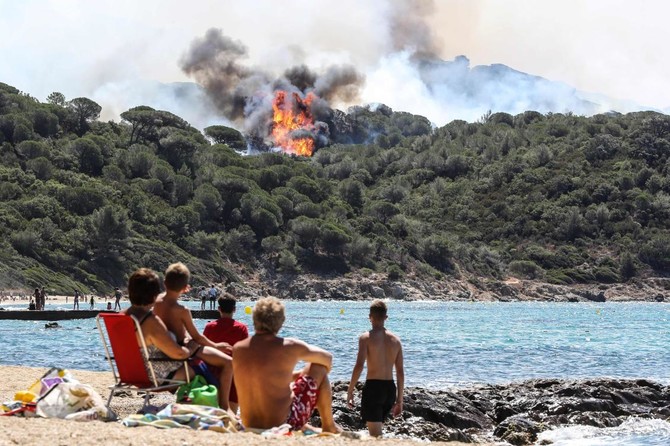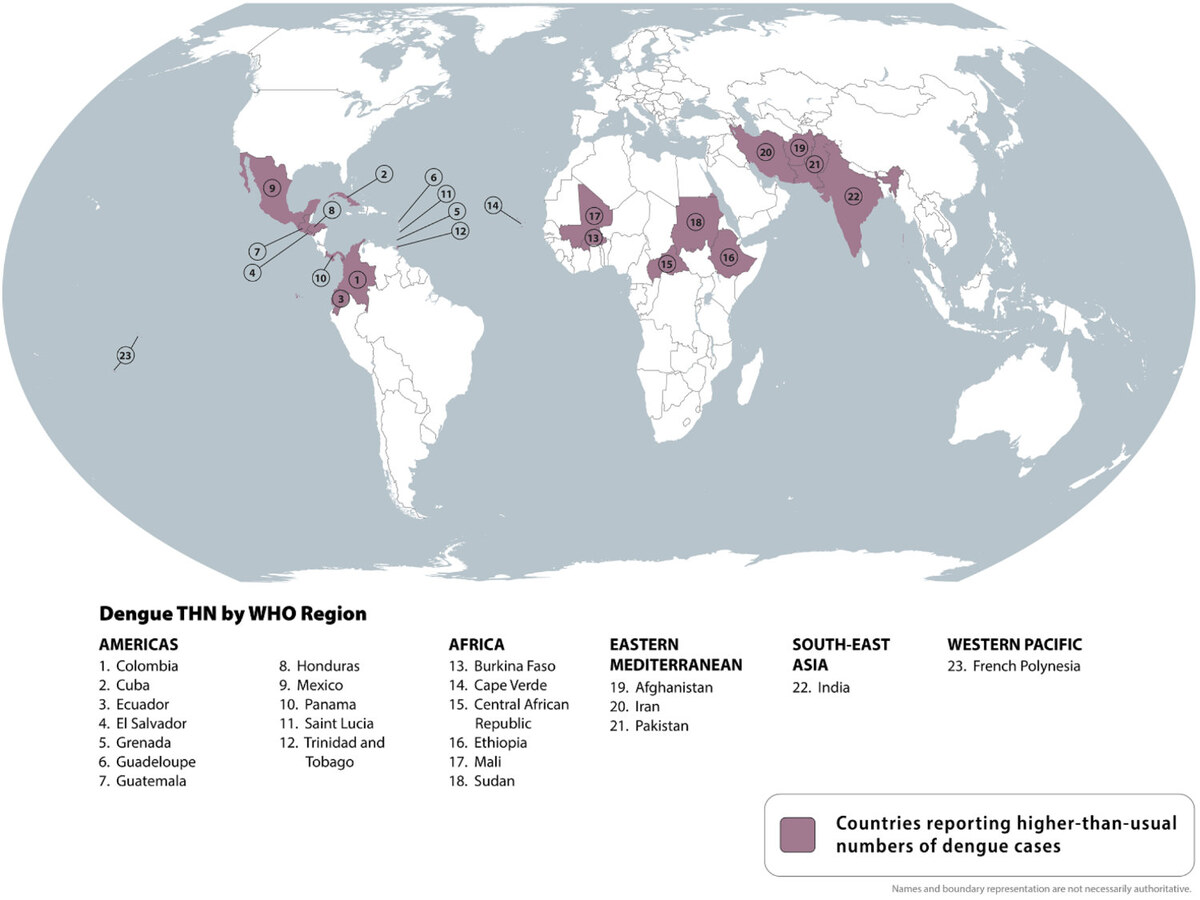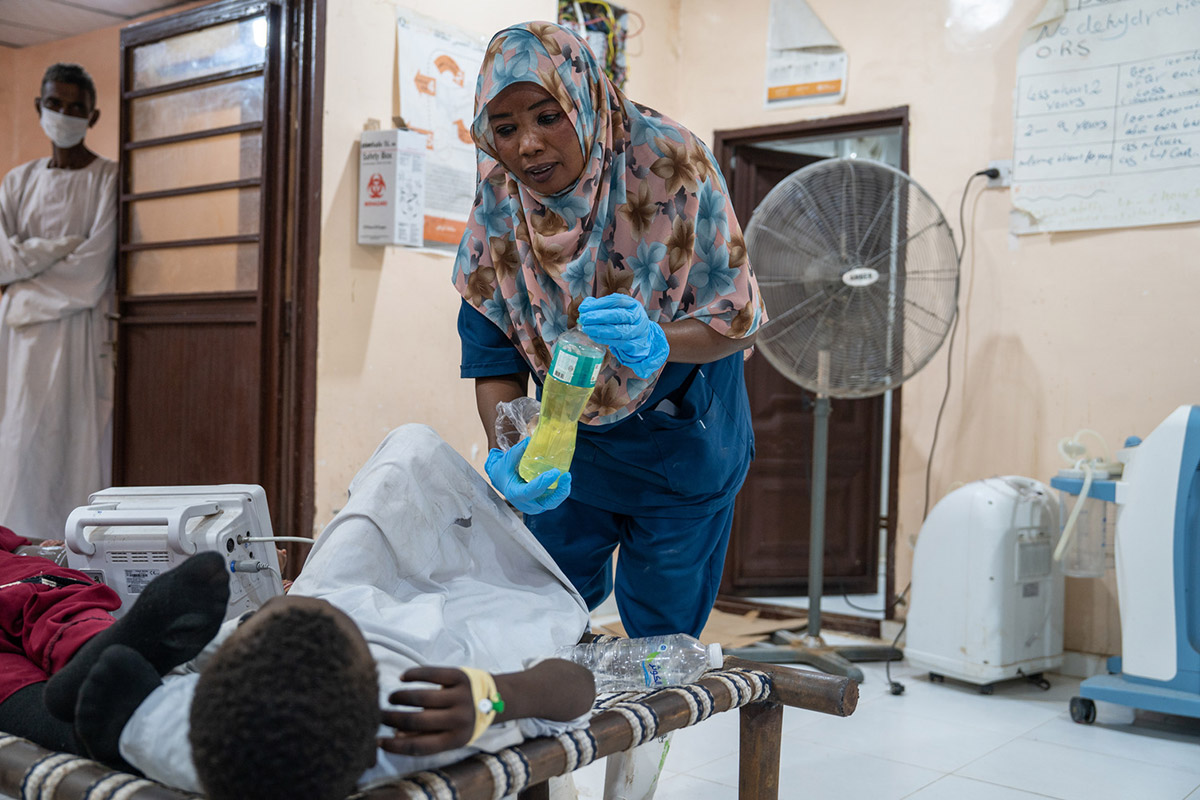FRANCE: At least 10,000 people were evacuated overnight after a new wild fire broke out in southern France, which was already battling massive blazes that have consumed swathes of forest, authorities said Wednesday.
The new fire came a day after France asked for Europe’s help to tackle the flames already raging in the tinder dry south, including near the popular resort of Saint-Tropez.
“The evacuations, at least 10,000, followed the progression of the fire. It’s an area that doubles or triples its population in summer,” said a fire service official of the blaze near Bormes-les-Mimosas on the Mediterranean coast.
The number of people on France’s Cote d’Azur bulges in July and August as holidaymakers head to the beach, though the area is experiencing an exceptionally hot, dry summer that has made it especially vulnerable to fires.
On Tuesday over 4,000 firefighters and troops backed by 19 water bombers had already been mobilized to extinguish the flames, which have left swathes of charred earth in their wake.
At least 12 firefighters have been injured and 15 police officers affected by smoke inhalation since the fires broke out on Monday, according to the authorities.
The blazes on Tuesday had devoured around 4,000 hectares (15 square miles) of land along the Mediterranean coast, in the mountainous interior and on the island of Corsica.
With strong winds and dry brush creating a dangerous mix, the government asked its European Union partners to send two extra fire-fighting planes — a request immediately fulfilled by Italy, according to the EU.
But one union official denounced what he said was a lack of spare parts preventing all the aircraft required from being put into action.
Interior Minister Gerard Collomb announced on Tuesday that France would be adding six more firefighting planes to its fleet during a visit to Corsica.
A fire in La Croix-Valmer near Saint-Tropez, a resort frequented by the rich and famous, had been contained, local fire chief Philippe Gambe de Vergnes said Tuesday.
But the blaze had already consumed 400 hectares of coastal forest in an area dotted with homes, he said. More than 200 people had to be moved from the area.
La Croix-Valmer’s deputy mayor Rene Carandante described a desolate landscape of blackened headlands fringed by charred umbrella pines, where green forest had once framed the azure waters of the Mediterranean.
“It’s a disaster area. There’s nothing left,” he said.
Francois Fouchier, of the local coastal conservation group, told AFP that local wildlife, such as the Hermann’s tortoises, would be victims of the fires. “We are going to find burnt shells.”
Around 80 kilometers (50 miles) inland, 300 hectares of pines and oaks went up in smoke near the village of Saint-Maximin-la-Sainte-Baume.
A local official accused the authorities of failing to regularly remove dry undergrowth, making the forest a fire hazard.
The French island of Corsica, situated midway between France and Italy, was also assessing the damage.
A resident, whose house had at one point been in danger, spoke of “apocalyptic” scenes.
In the end, disaster was averted after the wind died down, but the blaze engulfed 1,800 hectares of forest and burned several vehicles.
Further east, in Carros, north of Nice, a house, three vehicles and a warehouse went up in flames, according to regional authorities.
Speaking to France Info radio, Mayor Charles Scibetta described waking up to a “lunar landscape” and said the inhabitants had a lucky escape.
“All of France is mobilized,” the head of the fire service in southeast France, Col. Gregory Allione told France Info, adding that extra firefighters had been drafted in from the north.
Thomas Curt, a director at the Irsea institute for research into the environment and agriculture, said a fall-off in farming in southeast France since the 1970s had made it more prone to fires.
“Farmland is contracting and the forest is naturally expanding, making the area bushier,” he said.
A proliferation in the numbers of homes, roads and power lines near forests also increased the fire hazard, he added.
In mid-July, a blaze believed to have been ignited by a cigarette butt tossed out of a car ripped through 800 hectares of land near Aix-en-Provence.
Portugal, meanwhile, which last month suffered deadly forest fires, has been battling fresh blazes since Sunday in center of the country, forcing the evacuation of around 10 villages.
10,000 evacuated over new wildfire in France
10,000 evacuated over new wildfire in France

Why child-killer diseases like dengue, cholera and mpox have surged worldwide

- Three child-killer diseases witnessed major resurgences in 2024, fuelled partly by climate crises and conflict
- Poor sanitation, displacement, and war-damaged infrastructure left millions vulnerable to fatal illnesses
DUBAI: When the UN launched the Sustainable Development Goals in 2015, it set out a bold action plan to eliminate premature death and needless suffering caused by preventable diseases by 2030.
With just five years to go, the world appears to be moving backwards. Indeed, 2024 actually witnessed an alarming surge in a triad of preventable or manageable child-killer diseases.
Dengue, cholera and mpox returned with a vengeance, claiming the lives of thousands of children. With their weaker immune systems, the young are particularly vulnerable to infection and often fatal complications.

Bangladeshi children suffering from dengue fever rest at a ward at the Mugda Medical College and Hospital in Dhaka on August 8, 2019. (AFP file)
This multifaceted health emergency has compounded the suffering of already stricken communities in impoverished countries and conflict zones, where climate change, inequality and underfunded health systems have left many without access to basic care or sanitation.
“Currently, about half of the world’s population is not fully covered by essential, quality, affordable health services, denying them their right to health,” said Dr. Revati Phalkey, global health and nutrition director at Save the Children International.
“Health systems are under enormous pressure to deliver universal health coverage, with the majority of countries experiencing worsening or no significant change in service coverage since the launch of the Sustainable Development Goals in 2015.”
According to the World Health Organization, dengue fever — a mosquito-borne disease that causes severe fever, pain and in some cases death — saw an alarming spike in 2024.
Dengue cases doubled from 6.65 million in 2023 to 13.3 million in 2024. The total number of dengue-related deaths globally last year was 9,600. The WHO estimates some four billion people are now at risk of dengue related viruses.

Children who play outside with limited protection against mosquitoes are often more exposed and therefore more vulnerable to the virus than adults. The absence of mosquito nets where children sleep is also a key contributing factor.
In developing countries in Southeast Asia, parts of Africa, Latin America and the Caribbean, dengue fever is especially prevalent. Informal settlements in these regions often lack basic infrastructure for waste management, sewage or clean water.
These conditions offer a fertile breeding ground for mosquitoes and for the disease to spread. Meanwhile, rising temperatures associated with climate change have expanded the range of mosquito habitats, allowing them to flourish across a wider region.
The spread of dengue, sometimes known as “breakbone fever” due to the severe fatigue it causes, represents “an alarming trend” according to WHO Director General Dr. Tedros Adhanom Ghebereyesus, with 5 billion people at risk of being infected by 2050.
FASTFACT
13,600
Deaths from dengue, cholera, or mpox in 2024.
Dengue is not the only danger. In Yemen, Sudan and Gaza, where conflict has displaced thousands and destroyed critical civilian infrastructure, cholera has become a major threat to adults and children alike.
A deadly bacterial infection spread through contaminated water, cholera is another consequence of poor sanitation. The infection causes rapid dehydration through severe diarrhea and vomiting, which can quickly lead to death if left untreated.
The UN Relief and Works Agency for Palestine Refugees in the Near East released a statement in June warning of a cholera outbreak in the Gaza Strip amid severe water shortages and damage to sanitation services.
Several UN agencies have issued warnings about the high risk of infectious diseases in overcrowded refugee camps across the Middle East and North Africa, where displaced households have limited access to clean water and proper sanitation.
In Sudan, as of last November, the WHO reported more than 37,514 cholera cases across the country and at least 1,000 deaths. “We are racing against time,” Sheldon Yett, the UN children’s fund representative to Sudan, said in a statement in September.
“We must take decisive action to tackle the outbreaks as well as invest in the health systems underpinning the essential services vulnerable children and families in Sudan so desperately need.”

Despite efforts by the international community to provide vaccines and clean water, outbreaks in conflict zones have proven difficult to keep under control. The collapse of sanitation services, in particular, has left millions of children vulnerable to the disease.
Although the overall number of cholera cases worldwide fell by 16 percent in 2024, there has been a 126 percent spike in the number of deaths as a result of the disease.
Another health crisis threatening the world’s children is mpox, formerly known as monkeypox. The virus reemerged in 2024 to devastating effect across parts of Africa, with children suffering the most severe consequences.
Once a rare disease confined to rural areas of Central and West Africa, mpox has now become a significant public health crisis with thousands of reported infections, particularly among children under the age of five.
Mpox, contracted through contact with infected people and animals, bodily fluids and contaminated objects, causes fever, rashes, and painful lesions that in turn can lead to other illnesses and afflictions such as pneumonia and blindness.
While it can be controlled using vaccines, such resources remain scarce in parts of Africa. Having already been overwhelmed by Ebola and malaria, the region’s health systems are stretched to the limit, leaving treatment out of reach for thousands of children.
Moreover, poor sanitation, crowded living conditions, and rapid urbanization have increased the risk of transmission.
Children in the east of the Democratic Republic of Congo have been the worst affected by the mpox virus, with the WHO declaring the outbreak a public health emergency of international concern. Around 75 percent of cases are in children under the age of 10.
The surge in these diseases reflects the broader, interconnected crises faced by the world, where the most vulnerable populations are left with limited means to recover and adapt.
In wealthier countries, child deaths resulting from cholera and dengue have dropped significantly thanks to well-functioning sanitation services and accessible healthcare systems that have weathered the blows of the coronavirus pandemic.
However, in low income countries, particularly those in the midst of conflict, healthcare systems are extremely vulnerable, with medical staff overstretched, medicines in short supply, and wards overwhelmed by the sick and wounded.
The grim reality for millions of children across the world underscores the urgent need for global action.
“We need greater global investments to build strong health systems that are able to deliver essential health services, especially vaccines and essential medicines, while responding to global health emergencies including emerging issues like mpox,” said Dr. Phalkey.
“It is time for governments and the international community to step up and ensure all children are protected against disease and have access to adequate health services when they need them and where they need them.
“Every child has the right to survive and thrive, and it is our collective responsibility to deliver on this.”

CIA now says COVID-19 ‘more likely’ to have come from lab

- The agency had for years said it could not conclude whether COVID-19 was the result of a lab incident or it originated in nature
- The CIA says it has “low confidence” in its assessment that a “research-related origin of the COVID-19 pandemic is more likely“
NEW YORK: The Central Intelligence Agency has assessed that the COVID-19 pandemic is “more likely” to have emerged from a lab rather than from nature, an agency spokesperson said on Saturday.
The agency had for years said it could not conclude whether COVID-19 was the result of a lab incident or it originated in nature. But in the final weeks of the Biden administration, former CIA Director William Burns asked CIA analysts and scientists to make a clear determination, stressing the pandemic’s historical significance, according to a senior US official.
The CIA says it has “low confidence” in its assessment that a “research-related origin of the COVID-19 pandemic is more likely” and notes in its statement that both scenarios — lab origin and natural origin — remain plausible.
The Chinese embassy in Washington did not immediately respond to a request for comment.
It was unclear the extent to which the agency has collected new intelligence on COVID-19’s origins and whether that new evidence was used to formulate the latest assessment.
China’s government says it supports and has taken part in research to determine COVID-19’s origin, and has accused Washington of politicizing the matter, especially because of efforts by US intelligence agencies to investigate.
Beijing has said claims that a laboratory leak likely caused the pandemic have no credibility.
In an interview with Breitbart following his confirmation by the US Senate on Friday, CIA Director John Ratcliffe said one of his first priorities was getting his agency to make a public assessment on the pandemic’s origins.
“That’s a day-one thing for me,” he said. “I’ve been on record as you know in saying I think our intelligence, our science, and our common sense all really dictate that the origins of COVID was a leak at the Wuhan Institute of Virology.”
New Delhi probes mystery illness after 17 die in India-administered Kashmir

- The deaths, including those of 13 children, have occurred in the remote village of Badhaal in Rajouri area since early December
- All of the fatalities had damage to the brain and nervous system, said Amarjeet Singh Bhatia, who heads Rajouri’s medical college
SRINAGAR: Authorities in India-administered Jammu and Kashmir were investigating a mysterious disease that has claimed the lives of 17 people, local media reports said Saturday.
The deaths, including those of 13 children, have occurred in the remote village of Badhaal in Jammu’s Rajouri area since early December.
The village was declared a containment zone earlier this week with around 230 people quarantined, the Press Trust of India (PTI) news agency reported.
All of the fatalities had damage to the brain and nervous system, Amarjeet Singh Bhatia, who heads Rajouri’s government medical college, said.
“The winter vacations have also been canceled to deal with the medical alert situation,” PTI quoted Bhatia as saying.
The victims were members of three related families.
The federal government has launched an investigation with health minister Jitendra Singh saying an initial probe suggested the deaths were “not due to any infection, virus or bacteria but rather a toxin.”
“There is a long series of toxins being tested. I believe a solution will be found soon. Additionally, if there was any mischief or malicious activity, that is also being investigated,” PTI quoted Singh as saying.
In a separate medical incident, authorities in the western city of Pune recorded at least 73 cases of a rare nerve disorder.
Those infected with Guillain-Barre Syndrome (GBS) include 26 women and 14 of the patients are on ventilator support, PTI quoted an official as saying.
In GBS, a person’s immune system attacks the peripheral nerves, according to the World Health Organization.
The syndrome can impact nerves that control muscle movement which may lead to muscle weakness, loss of sensation in the legs or arms and those infected can face trouble swallowing and breathing.
India is undergoing transformative change, says Indian CG in Republic Day message

- India celebrates 76th Republic Day on Sunday
- Relationship between Saudi Arabia and India continues to thrive
On the occasion of the 76th Republic Day of India, I extend my warmest greetings to all Indian nationals in the Kingdom of Saudi Arabia, and to our esteemed friends in the country.
Republic Day is a time to reflect on the values that shape India, honor the sacrifices of our forebears, and celebrate our continued progress as a nation.
The Constitution of India beautifully outlines the principles that form the foundation of our nation’s remarkable journey. It is a source of pride for every Indian to be part of this ongoing story, one of hope, resilience and success.
Today, India is undergoing transformative change, with significant progress in infrastructure, technology and industrial development. Our economy, now the fifth-largest globally, is poised to become the third-largest in the next few years. We are expanding connectivity, supporting innovation and building a future-driven workforce, all while navigating global challenges.
The bilateral relationship between India and Saudi Arabia continues to thrive, with high-level bilateral visits and engagements becoming increasingly frequent; growing cooperation across trade, energy, defense, and cultural domains; and many new opportunities for collaboration.
We extend our sincere gratitude to King Salman, Crown Prince Mohammed bin Salman, the nation’s government and its people for their care and the warm hospitality extended to the 2.5 million Indians living in the Kingdom. The Indian community remains a vital bridge between our nations, contributing significantly to Saudi Arabia’s growth and prosperity.
We also express our sincere appreciation for the cooperation in facilitating the safe and enriching experiences of Indian pilgrims during Hajj and Umrah. We look forward to further strengthening this partnership to ensure the best experience and safety for our pilgrims during the upcoming Hajj 2025.
As we celebrate the 76th Republic Day, let us continue to work toward a future of peace, prosperity and deeper ties between India and Saudi Arabia.
Happy Republic Day to all. Jai Hind!
— Fahad Ahmed Khan Suri is India’s consul general in Jeddah.
Elon Musk addresses German far-right rally by video link

- Musk told a gathering of thousands of AfD supporters in the eastern city of Halle that their party was “the best hope for the future of Germany“
- “The German people are really an ancient nation which goes back thousand of years“
HALLE, Germany: US tech billionaire Elon Musk gave a video address to a campaign rally of Germany’s anti-immigration AfD party Saturday, his latest show of support ahead of the country’s election next month.
Musk told a gathering of thousands of AfD supporters in the eastern city of Halle that their party was “the best hope for the future of Germany.”
Musk has raised concern from some mainstream leaders who have accused him of interfering in European politics with comments on his social platform X about politicians in countries including Germany and Britain.
He also drew criticism this week for making a public hand gesture that was seen by some as resembling a straight-armed Nazi salute.
“The German people are really an ancient nation which goes back thousand of years,” he said in Saturday’s address.
“I even read Julius Caesar was very impressed (by) the German tribes,” he said, urging the supporters to “fight, fight, fight” for their country’s future.
He said the AfD wanted “more self-determination for Germany and for the countries in Europe and less from Brussels,” a reference to European Union authorities.
Musk is a close associate of US President Donald Trump, who has appointed him to head a new department of “government efficiency” in his administration.
Like Trump, the AfD opposes immigration, denies climate change, rails against gender politics and has declared war on a political establishment and mainstream media it condemns as censorious.
Ahead of Germany’s February 23 elections, it is polling at around 20 percent, a new record for a party that has already shattered a decades-old taboo against the far right in post-war Germany.
The mainstream conservative grouping CDU/CSU leads on about 30 percent.

















